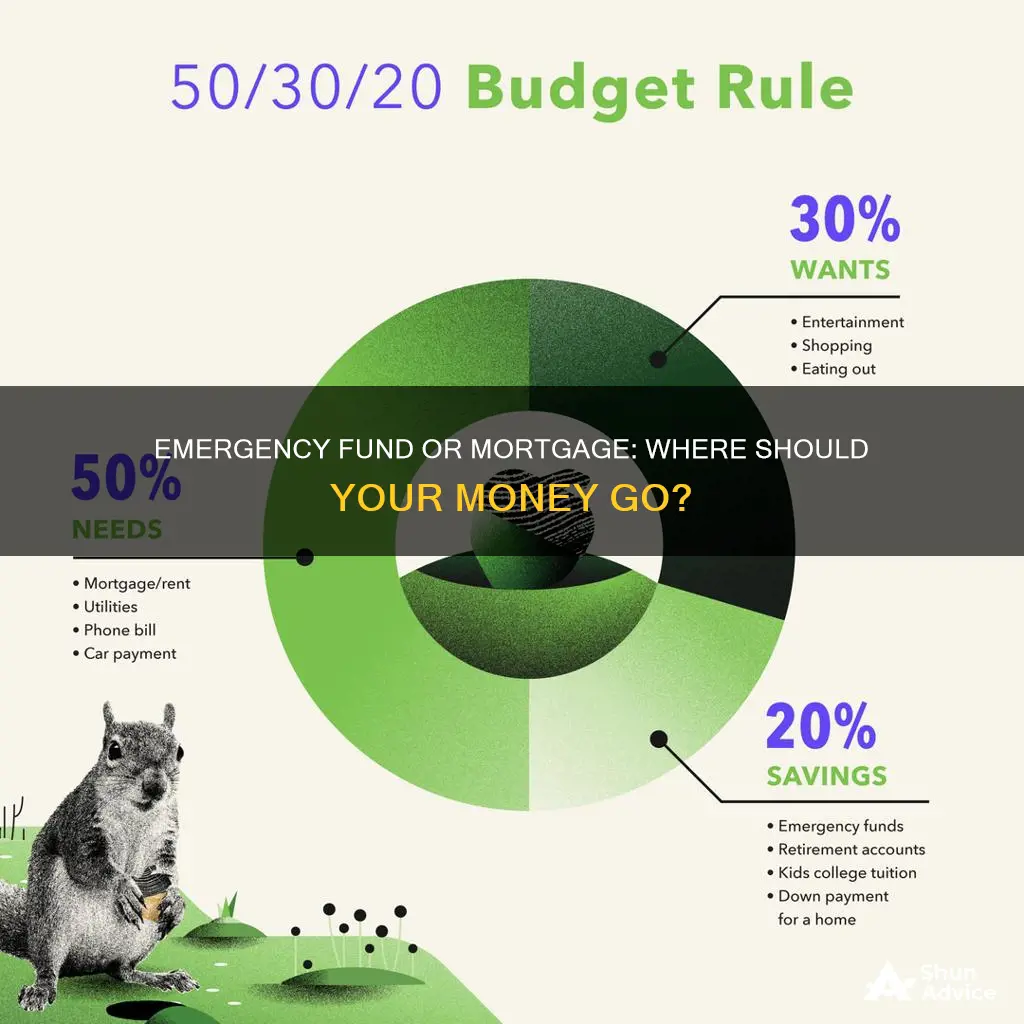
How much money should you set aside for emergencies before prepaying your mortgage? This is a tricky question as it depends on your financial situation and goals. Financial experts recommend having three to six months' worth of living expenses saved up, including rent or mortgage payments, utilities, groceries, transportation, insurance, and other bills. If you have a stable job and income, three months' worth of expenses might suffice, while those with volatile income may prefer to aim for six months or more. It's also essential to consider your debt obligations and any high-interest consumer debt, which should be prioritized to prevent income drain. Building an emergency fund is generally a priority, but prepaying your mortgage with other money can make sense if you have a high-interest rate.
| Characteristics | Values |
|---|---|
| How much to save in an emergency fund | 3-6 months' worth of living expenses |
| Where to keep an emergency fund | Savings account, money market account, high-yield savings account |
| When to use an emergency fund | When you have to pay for large, unexpected expenses |
| Prepaying mortgage with an emergency fund | Not recommended as it may not cover other emergencies |
What You'll Learn

Emergency funds are for unexpected costs
The exact amount you should have in your emergency fund depends on your personal financial situation, including your household, income, debt, and financial goals. For example, if you have a stable job with a regular income, you may only need three months' worth of expenses saved. On the other hand, if you have a volatile income or are self-employed, you may want to aim for six months or more.
It is important to keep your emergency fund in a safe and accessible place, such as a savings account, money market account, or high-yield savings account. This will allow you to easily access your funds in the event of an emergency. Building an emergency fund can take time, but it is an important step in securing your financial future. You can use an emergency fund calculator to help you determine how much you should save.
While it is important to make minimum monthly payments on debts such as your mortgage, it is generally recommended to prioritize building an emergency fund over paying extra towards these debts. This is because emergency funds can help you cover unexpected expenses without taking on additional high-interest debt. However, if you have high-interest consumer debt that is draining your income and preventing you from saving, it may be more productive to focus on paying off this debt first.
Late Mortgage Payment: 30-Day Delay, Big Trouble?
You may want to see also

Save 3-6 months' worth of expenses
Saving 3-6 months' worth of expenses is a common recommendation for an emergency fund. This fund should be separate from your mortgage prepayment savings.
The exact amount you should save depends on your personal circumstances and financial goals. If you have a stable job with a regular income, 3 months' worth of expenses may be sufficient. However, if your income is less predictable, you may want to aim for 6 months or more. Other factors to consider include your level of debt, any dependents you have, and your overall financial goals. For example, if you're planning to start a family or buy a home soon, you may want to save more aggressively.
It's important to keep your emergency fund in a safe and accessible place. A savings account is a good option as it provides easy access to cash if needed. A high-yield savings account will help grow your balance by paying a higher-than-average interest rate. You can also consider a money market account, which offers more flexibility with a debit card or check-writing privileges.
Building an emergency fund can take time, so it's a good idea to start with a smaller, more achievable goal and gradually increase it. Automating your savings by setting up a monthly automatic transfer from your checking account to your savings account can make this process easier.
Remember, an emergency fund is meant to be tapped into for unexpected expenses, so don't be afraid to use it when necessary. However, if your emergency fund is growing and you have more than you need for 3-6 months' worth of expenses, you may consider applying extra funds toward your debt obligations, especially higher-interest accounts.
Mortgage Pools: How Are They Sold?
You may want to see also

Keep funds in a savings account
Keeping your emergency fund in a savings account is a good idea. This is because it provides easy access to cash if you need it. A high-yield savings account will help you grow your balance by paying a higher-than-average interest rate. Some savings accounts have rates above 5%.
You can also automate your savings by setting up a monthly automatic transfer from your checking account to your savings account. This way, you won't have to think about saving—it will happen automatically.
It is recommended that you have enough savings to cover three to six months' worth of living expenses. If you have a stable job with a regular income, you may be able to get by with three months' worth of living expenses. However, if your income is unpredictable, you may need to save more.
Additionally, if you have consumer debt (any debt besides your mortgage), you should save at least $1,000 for your starter emergency fund. This will help you avoid taking on more debt in the future.
While it may be tempting to pay off your mortgage early, it is important to remember that an emergency fund is meant to be easily accessible. Prepaying your mortgage may not save you any interest, and you would lose the flexibility that an emergency fund provides.
Mortgage Surveys: Accurate or Fiction?
You may want to see also

Don't invest emergency funds
It is generally advised not to invest emergency funds, as doing so could be disastrous if your assets lose value by the time you need to make a withdrawal. For example, if you deposit $5,000 into a savings account, you will still have $5,000 in the account a few months later. However, if you invest that $5,000 into stocks or index funds, it could be worth $6,000 in a few months if your investments increase in value. But it could also be worth $4,000, or even less, if your investments lose value. This means you could end up with less money to cover a surprise expense.
Instead of investing your emergency fund, you could consider putting your money into a high-yield savings account. This will allow you to preserve your total balance regardless of market volatility, and you will earn interest on your savings. Savings accounts are a safe place to store your emergency fund, as they provide easy access to cash if you need it.
It is recommended that you have enough savings to cover three to six months' worth of living expenses. If you have a stable job with a regular income, you may be able to get by with three months' worth of savings. However, if your income is unpredictable, you may want to save for six months or more.
You can use an emergency fund calculator to determine how much you should save. This will take into account your monthly expenses, such as rent or mortgage payments, utilities, groceries, transportation, insurance, and any other recurring bills. You should also consider your risk factors, such as your job stability and income predictability, as well as your comfort level and financial goals.
Remember, an emergency fund is meant to be tapped and replenished, so don't be afraid to use it when unexpected expenses arise.
Mortgage Market: Current Trends and Challenges
You may want to see also

Pay minimum debt monthly
When considering whether to focus on building an emergency fund or prepaying your mortgage, it is essential to understand the benefits and drawbacks of each option. Paying the minimum debt each month can be a strategic decision that provides flexibility and financial stability. Here are some reasons why paying the minimum monthly debt can be advantageous:
Building an Emergency Fund: An emergency fund is a crucial component of financial security. Life is unpredictable, and unexpected expenses can arise at any time. By paying only the minimum required on your mortgage, you can free up extra cash to build a substantial emergency fund. Typically, it is recommended to have enough savings to cover three to six months' worth of living expenses. This fund can provide a safety net in case of unforeseen events such as job loss, medical emergencies, or home repairs.
Valuing Mortgage Bonds: The Intricacies of Pricing and Risk
You may want to see also
Frequently asked questions
It is recommended that you save three to six months' worth of expenses in your emergency fund. This can vary depending on your personal and financial goals, as well as your household, income, and debt. If you have a stable job and income, you may be able to save less, whereas if your income is unpredictable, you may need to save more.
A savings account is the best place to keep your emergency fund as it provides easy access to cash if you need it. A high-yield savings account will help you grow your balance by paying a higher-than-average interest rate.
Yes, it is generally recommended to prioritise an emergency fund over paying off your mortgage. This is because an emergency fund will protect you from debt and give you peace of mind. However, your personal financial situation will dictate when you should pay off debt or contribute to an emergency fund first.
You can build your emergency fund by setting a specific goal for how much you want to save and then automating your savings. This typically involves setting up a monthly automatic transfer from your checking account to your savings account.







